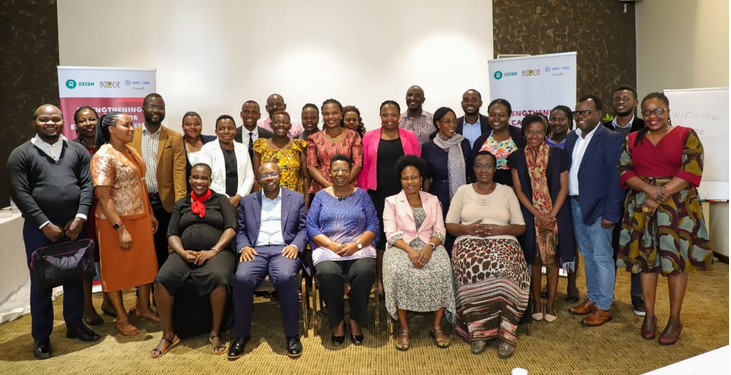By CHIMPREPORTS
By Happy Christine
Stakeholders from across Uganda on Wednesday convened at the illustrious Skyz Hotel for a momentous gathering aimed at addressing the critical issues of Women’s Economic Empowerment (WEE) and Unpaid Care Work.
The landmark event marked the inception of a meticulously planned project orchestrated by ACODE, signaling a bold stride towards enhancing gender equality and fostering women’s empowerment on a national scale.
Led by Dr. Arthur Bainomugisha, the Executive Director of Advocates Coalition for Development and Environment (ACODE), the Workshop served as a platform for comprehensive discussions and strategic planning. Dr. Bainomugisha emphasized the paramount importance of effective policy solutions and interventions in catalyzing tangible progress in the realm of gender equality.
Central to the initiative is the commitment to strengthening the capacity of key WEE policy actors and champions through targeted training sessions in gender analysis and advocacy. This strategic approach underscores ACODE’s dedication to equipping stakeholders with the tools and knowledge needed to drive meaningful change in their respective spheres of influence.
Furthermore, the establishment of a national-level community of practice on Women’s Economic Empowerment and Care represents a pivotal step towards fostering collaboration and knowledge exchange. By facilitating dialogue and collaboration among diverse stakeholders, ACODE aims to amplify the impact of efforts aimed at advancing gender equality and women’s empowerment across Uganda.
Dr. Susan Kavuma, the principal investigator at ACODE and senior lecturer at Makerere University, shed light on the critical role of informed policy-making in addressing entrenched gender disparities. Through rigorous analysis and evidence-based decision-making, Dr. Kavuma emphasized the potential to effect positive change in Uganda’s socio-economic landscape.
A key focus of the discussions revolved around the disproportionate burden borne by women in unpaid care work. Recognizing the invaluable contribution of women to household and community well-being, stakeholders underscored the need to rectify inequalities in resource access and opportunities.
Charles Opio, representing Mr. Francis Odokorach, the Country Director of Oxfam in Uganda, emphasized the imperative of valuing and recognizing the significant contributions of women in unpaid care work. Opio highlighted the intersectionality of gender and economic empowerment, stressing the importance of ensuring that women’s labor is duly acknowledged and rewarded.
As the discussions unfolded, a palpable sense of optimism permeated the room, buoyed by the collective commitment to driving forward the agenda of gender equality and women’s empowerment in Uganda. Participants expressed confidence in the transformative potential of the project, viewing it as a catalyst for fostering a more inclusive and equitable society.
Hon. Dr. Miria Matembe, a senior figure renowned for her advocacy of women’s rights, delivered impassioned remarks, underscoring the progress made in acknowledging women’s rights, while lamenting the persistent challenges and inequalities that persist. Dr. Matembe called for renewed mobilization and awareness to ensure that women’s unpaid care work is duly recognized and valued.
The workshop concluded on a note of determination and resolve, with stakeholders pledging to harness the momentum generated to drive tangible action and impact. ACODE’s collaboration with the Ministry of Gender, Labour, and Social Development further underscores the commitment to ensuring the success of WEE and Care Work interventions in Uganda.
In sum, the Workshop marked a significant milestone in Uganda’s journey towards gender equality and women’s empowerment. As the nation charts a course towards a brighter future, the collective efforts of stakeholders, guided by ACODE’s visionary leadership, hold the promise of ushering in a new era of equality, opportunity, and dignity for all.








Discussion about this post